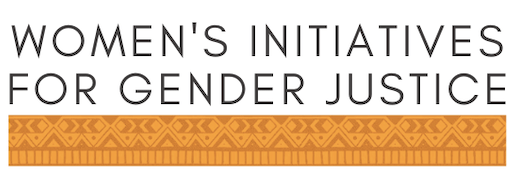Our Work

Key
Areas
Advocating for accountability and prosecution of sexual and gender-based violence (SGBV) crimes and gender justice before the International Criminal Court (ICC) and domestic courts and mechanisms
Supporting victims/survivors and building a gender justice field. We work with women most affected by the conflict situations under investigation by the ICC, and collaborate with more than 6,000 grassroots partners, associates and members across multiple armed conflict areas.

Advocating for gender justice through the ICC
- Legal, political and institutional monitoring of the ICC including the implementation of the Rome Statute, and analysis of all cases before the Court from a gender justice perspective.
- Strategic advocacy with the Office of the Prosecutor for the investigation and prosecution of SGBV crimes and the implementation of the new sexual and gender-based crimes policy, the first to be produced by an international criminal justice mechanism.
- Advocating for the participation of victims/survivors of SGBV before the ICC, and their access to reparations before the Court.
- Influencing and strengthening the gender competence of ICC staff through training and the recruitment and appointment of women, including experts on SGBV amongst the personnel of the Court.
- Facilitating and maintaining a pool of experts on SGBV , victims and witnesses and institutional aspects of gender mainstreaming to shape the mechanisms developed by the ICC.
- Filing observations before the Court
the Women’s Initiatives was the first NGO to file before the ICC and is the only international women’s human rights organisation to have been recognised with amicus curiae status by the Court. To date, the organisation has filed before the ICC on seven occasions, most recently on gender and reparations issues in the case of The Prosecutor v. Thomas Lubanga Dyilo.
Supporting victims/survivors and building a gender justice field
- Strengthening community services and support for SGBV victims/survivors. Supporting and collaborating with partners on two Transit House operations in North and South Kivu, DRC. The Transit Houses provide and facilitate access to medical and psychosocial support and local legal referrals for conflict-related SGBV victims/survivors including male victims of sexual violence. These services have included access to reparative surgeries and other specialised treatments for rape-related injuries, counselling and peer support, and legal representation.
- Working together with women, women’s groups and NGOs most affected by conflict in situations brought before the ICC, to ensure their concerns and issues are incorporated into ICC and domestic investigations and prosecutions.
- Conducting documentation and data collection in relation to the commission of SGBV crimes in armed conflicts. The Women’s Initiatives began its documentation programme in eastern DRC in 2006, which has supported ICC investigations related to SGBV.
- Enhancing capacity among women, particularly women’s NGOs, in armed and post–conflicts situations on the use of advocacy to promote women’s human rights and gender equality, principally with domestic decision-makers in order to strengthen domestic conflict-related SGBV accountability mechanisms.
- Implementing and supporting strategic screenings in the DRC and Uganda which train local women and partners in advocacy skills to increase the awareness and knowledge of decision makers and community members of issues related to SGBV. Women are trained in capturing the stories of victims/survivors in order to give them a voice. The capacity of the women and NGOs are also increased through tools and training in utilising these screenings as methods of advocacy and platforms for community discussion. The strategic screenings target local, regional and international decision-makers, the legal community, media, traditional and faith leaders, and the local community. These screenings provide women the opportunity to teach, to engage, to raise their voices and to learn skills of advocacy and political participation. There are two primary screening projects:
1. The DRC gender justice documentary Our Voices Matter, filmed and produced in 2012 by local partners and the Women’s Initiatives, in collaboration with WITNESS, highlights conflict-related SGBV in three provinces in eastern DRC (North and South Kivu, Province Orientale). These screenings and associated advocacy events target local leaders and decision-makers, the legal community (judges, military prosecutors, police), traditional and faith leaders, as well as national decision-makers (key government ministries including the new sexual violence envoy for DRC) in conflict-affected communities in eastern DRC.
2. The Ugandan gender justice documentary No Longer Silent (filmed and produced in 2012 by GNWVPN and the Women’s Initiatives, in collaboration with WITNESS) which highlights SGBV and other issues for women in relation to the LRA conflict, the Juba peace agreements and specifically implementation of the PRDP for northern Uganda. The gender justice video is screened to local, district and national decision-makers, traditional and religious leaders, local communities and the media, as well as regional and international decision-makers.
- Providing assistance to women human rights defenders.
- Legal monitoring and advocacy of the domestic investigations and prosecutions of conflict-related sexual violence. 1. Supporting national law reform to advance women’s human rights through use of the Rome Statute and domestic implementing legislation. 2. Training activists, lawyers and judges on the Rome Statute and international jurisprudence regarding SGBV crimes.
- Supporting conflict-resolution and integration of gender issues within the negotiations and implementation of Peace Agreements (Uganda, DRC, Darfur), and advocating on the implementation of the recently completed Ugandan Transitional Justice Policy.

